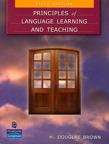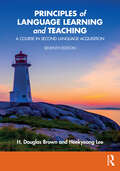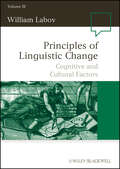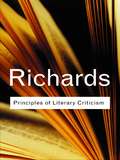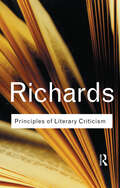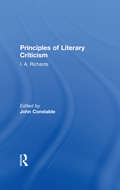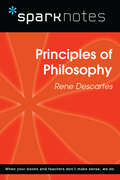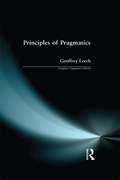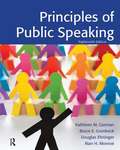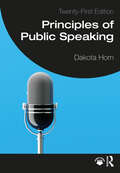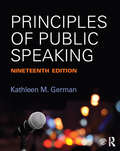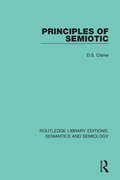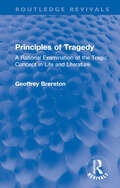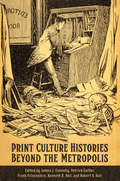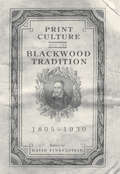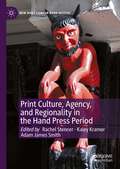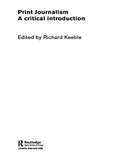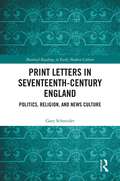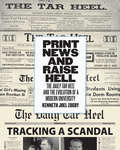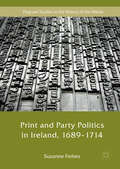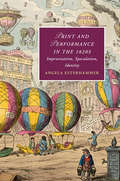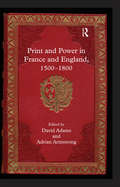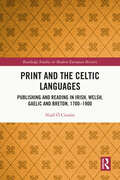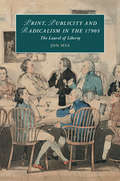- Table View
- List View
Principles of Language Learning and Teaching (Fifth Edition)
by H. Douglas BrownPrinciples of Language Learning and Teaching, Fifth Edition, by H. Douglas Brown, is the classic second language acquisition text used by teacher education programs worldwide. Principles introduces key concepts through definitions of terms, thought-provoking questions, charts, and spiraling. New Classroom Connections encourage students to consider the implications of research for classroom pedagogy. An up-to-date bibliography and new glossary provide quick access to important works and key terminology in the field. The fifth edition takes a comprehensive look at foundations of language teaching through discussions of the latest research in the field, including: * Vygotsky's and Bakhtin's theories * Thorndike's law of effect * error treatment, noticing, recasts * intercultural communication * language policy and politics * corpus linguistics *hot topics in SLA * connectionism and emergentism * flow theory, willingness to communicate * strategies-based instruction * contrastive rhetoric * attribution theory, self-efficacy * output hypothesis Also by H. Douglas Brown: Teaching by Principles: An Interactive Approach to Language Pedagogy Language Assessment: Principles and Classroom Practices Strategies for Success: A Practical Guide to Learning English
Principles of Language Learning and Teaching: A Course in Second Language Acquisition
by H. Douglas Brown Heekyeong LeeThe seventh edition of this classic second language acquisition (SLA) text provides an overview of the theoretical foundations of language teaching. This new edition has been updated to capture current research and practice in the field. Among concepts that are either redefined or entirely new are: Language learning in an era of globalization and multilingualism The significance of transnationalism, identity, investment, agency, and ideology Language learning as situated, usage-based, and socioculturally contextualized The importance of emotional engagement, intercultural sensitivity, and self-efficacy in language learning Transdisciplinary and ecological approaches as keys to language teaching in the 21st century The seventh edition also retains useful historical information and foundational cornerstones of SLA that teachers have found beneficial in their instruction. Key principles continue to be presented and explained with direct application to classroom language education and real-life contexts. Features such as "Points to Ponder" (questions for readers’ personal reflection), classroom connections and "Tips for Teaching," suggested readings, and a glossary of terminology are updated in this edition. With its reader-friendly style, practical pedagogical tools, and comprehensive coverage of state-of-the-art research findings, this edition serves as an essential resource for language teacher education programs worldwide, catering to the needs of both novice and experienced language teachers.
Principles of Linguistic Change, Cognitive and Cultural Factors
by William LabovWritten by the world-renowned pioneer in the field of modern sociolinguistics, this volume examines the cognitive and cultural factors responsible for linguistic change, tracing the life history of these developments, from triggering events to driving forces and endpoints.Explores the major insights obtained by combining sociolinguistics with the results of dialect geography on a large scaleExamines the cognitive and cultural influences responsible for linguistic changeDemonstrates under what conditions dialects diverge from one anotherEstablishes an essential distinction between transmission within the community and diffusion across communitiesCompletes Labov's seminal Principles of Linguistic Change trilogy
Principles of Literary Criticism
by I. A. RichardsIvor Armstrong Richards was one of the founders of modern literary criticism. He enthused a generation of writers and readers and was an influential supporter of the young T.S. Eliot. Principles of Literary Criticism was the text that first established his reputation and pioneered the movement that became known as the 'New Criticism'. Highly controversial when first published, Principles of Literary Criticism remains a work which no one with a serious interest in literature can afford to ignore.
Principles of Literary Criticism (Penguin Classics Series)
by I. A. RichardsIvor Armstrong Richards was one of the founders of modern literary criticism. He enthused a generation of writers and readers and was an influential supporter of the young T.S. Eliot. Principles of Literary Criticism was the text that first established his reputation and pioneered the movement that became known as the 'New Criticism'. Highly controversial when first published, Principles of Literary Criticism remains a work which no one with a serious interest in literature can afford to ignore.
Principles of Literary Criticism V3 (Routledge Classics Ser.)
by John Constable I. A. RichardsFirst Published in 2001. This is Volume 3 of the Selected Works of I.A. Richards from 1919 to 1938 and concerns itself with the principles of literary criticism from 1924.
Principles of Literature MA Tamil First Year Second Semester: இலக்கியக் கொள்கைகள் எம். ஏ. தமிழ் முதலாமாண்டு இரண்டாம் பருவம்
by Institute Of Distance Education University Of Madrasஇந்தப் புத்தகம் இலக்கியக் கொள்கைகளின் அடிப்படைக் கருத்துகளை, வரலாற்று பின்னணியையும், முக்கியக் தத்துவங்களையும் விரிவாக விளக்குகிறது. பாரம்பரிய இலக்கியக் கொள்கைகள், நவீன சிந்தனைகள், இலக்கிய விமர்சனம், மொழி மற்றும் இலக்கியத்தின் உறவு போன்றவற்றை உள்ளடக்கியது. இது மாணவர்களுக்கு இலக்கியத்தின் தத்துவம், நோக்கம் மற்றும் சமூகப் பங்களிப்புகளை புரிந்துகொள்ள உதவும். பாடம் இலக்கியத்தின் அடிப்படைக் கொள்கைகளை ஆராய்ந்து, அதன் சமூக மற்றும் கலாசாரப் பங்களிப்புகளை விளக்குகிறது.
Principles of Philosophy (SparkNotes Philosophy Guide)
by SparkNotesPrinciples of Philosophy (SparkNotes Philosophy Guide) Making the reading experience fun! SparkNotes Philosophy Guides are one-stop guides to the great works of philosophy–masterpieces that stand at the foundations of Western thought. Inside each Philosophy Guide you&’ll find insightful overviews of great philosophical works of the Western world.
Principles of Pragmatics (Longman Linguistics Library)
by Geoffrey N. LeechOver the years, pragmatics - the study of the use and meaning of utterances to their situations - has become a more and more important branch of linguistics, as the inadequacies of a purely formalist, abstract approach to the study of language have become more evident. This book presents a rhetorical model of pragmatics: that is, a model which studies linguistic communication in terms of communicative goals and principles of 'good communicative behaviour'.In this respect, Geoffrey Leech argues for a rapprochement between linguistics and the traditional discipline of rhetoric. He does not reject the Chomskvan revolution of linguistics, but rather maintains that the language system in the abstract - i.e. the 'grammar' broadly in Chomsky's sense - must be studied in relation to a fully developed theory of language use. There is therefore a division of labour between grammar and rhetoric, or (in the study of meaning) between semantics and pragmatics.The book's main focus is thus on the development of a model of pragmatics within an overall functional model of language. In this it builds on the speech avct theory of Austin and Searle, and the theory of conversational implicature of Grice, but at the same time enlarges pragmatics to include politeness, irony, phatic communion, and other social principles of linguistic behaviour.
Principles of Public Speaking
by Kathleen M. German Alan H. Monroe Douglas Ehninger Bruce E GronbeckBalancing skills and theory, Principles of Public Speaking emphasizes orality, Internet technology, and critical thinking as it encourages the reader to see public speaking as a way to build community in today's diverse world. Within a framework that emphasizes speaker responsibility, critical thinking and listening, and cultural awareness, this classic book uses examples from college, workplace, political, and social communication to make the study of public speaking relevant, contemporary, and exciting. This brief but comprehensive book also offers the reader the latest in using technology in speechmaking, featuring a unique and exciting integrated text and technology learning system.
Principles of Public Speaking
by Dakota HornNow in its 21st edition, this introductory public speaking textbook encourages the reader to see public speaking as a way to build community in today’s diverse world.Within a framework that emphasizes speaker responsibility, listening, and cultural awareness, this classic book uses examples from college, the workplace, and political and social communication to make the study of public speaking relevant, contemporary, and exciting. Balancing skills and theory, new author Dakota Horn provides expanded coverage of speaking anxiety and understanding and delivering digital presentations along with two new chapters on culture and diversity and diversifying speeches. Each chapter also contains in-class applied activities to support students' learning.This textbook is ideal for general courses on public speaking as well as specialized programs in business, management, political communication, and public affairs.An Instructor’s Manual featuring discussion questions and guides, exercises, quiz questions, and suggestions and resources for syllabus design as well as PowerPoint slides is available at https://www.routledge.com/9781032537634
Principles of Public Speaking
by Kathleen GermanBalancing skills and theory, Principles of Public Speaking, 19th Edition, emphasizes orality, internet technology, and critical thinking as it encourages the reader to see public speaking as a way to build community in today’s diverse world. Within a framework that emphasizes speaker responsibility, listening, and cultural awareness, this classic book uses examples from college, workplace, political, and social communication to make the study of public speaking relevant, contemporary, and exciting. This edition opens with a new chapter on speaking apprehension, and offers enhanced online resources for instructors and students.
Principles of Semiotic (Routledge Library Editions: Semantics and Semiology)
by David S. ClarkeFirst published in 1987, this book is an attempt to re-establish semiotic on the basis of principles consistent with its past history, rather than the ‘cultural semiotics’ of the European tradition, and especially with the guiding ideas of Peirce and Morris. The book is divided into two parts, with the first two chapters providing the background for the more systematic discussions of signs at different levels taken up in the last three. In the final chapter issues that have become the focus of recent philosophy of language regarding the reference, meaning, and truth of sentences are discussed in light of the analogies to more primitive signs developed in the preceding two chapters.
Principles of Tragedy: A Rational Examination of the Tragic Concept in Life and Literature (Routledge Revivals)
by Geoffrey BreretonWhat is tragedy? What does the term imply? The word had outgrown its original context of literature and art and acquired wider and looser meanings. Originally published in 1968, Dr Brereton seeks to establish the basis of a definition which will hold good on various planes and over a wide range of dramatic and other literature. Various theories are examined, beginning with Aristotle and taking in the Marxist interpretation and the two main religious theories of the sacrificial hero and the built-in conflict in fallen human nature. These theories are tested out on representative works by Sophocles, Shakespeare, Racine, Ibsen, Beckett and others, and the findings which emerge are developed in the course of the book. This is conceived as a re-exploration of a widely debated subject in the light of a few clear basic principles. The result is a lucid study which will be especially valuable for students of literature and drama.
Print Culture Histories Beyond the Metropolis
by Frank Felsenstein James J. Connolly Patrick Collier Robert Hall Kenneth R. HallBringing together leading scholars of literature, history, library studies, and communications, Print Culture Histories Beyond the Metropolis rejects the idea that print culture necessarily spreads outwards from capitals and cosmopolitan cities and focuses attention to how the residents of smaller cities, provincial districts, rural settings, and colonial outposts have produced, disseminated, and read print materials.Too often print media has been represented as an engine of metropolitan modernity. Rather than being the passive recipients of print culture generated in city centres, the inhabitants of provinces and colonies have acted independently, as jobbing printers in provincial Britain, black newspaper proprietors in the West Indies, and library patrons in "Middletown," Indiana, to mention a few examples. This important new book gives us a sophisticated account of how printed materials circulated, a more precise sense of their impact, and a fuller of understanding of how local contexts shaped reading experiences.
Print Culture and the Blackwood Tradition
by David FinkelsteinIn late 1804, William Blackwood established a small publishing and bookselling firm in Edinburgh. Over the next 175 years, William Blackwood & Sons became one of the leading publishers in Britain, enjoying both local and international success. Early on it championed the works of Scottish writers, and later gained acclaim as the publisher of G.W. Steevens, George Eliot, Charles Whibley, and Joseph Conrad. Its political influence was also widespread; in 1817 it founded the monthly Blackwood's Magazine, which featured literary, critical, political, and journalistic commentary and analysis, and was a powerful force in British conservative politics.Two hundred years after the founding of this significant influence on British literary, political, and social history, this collection of essays reappraises the place of the Blackwood firm and its magazine in literary and print culture history. Editor David Finkelstein brings together an array of eminent scholars and critics from the US, Canada, Scandinavia, and the UK to examine Blackwoods from a variety of interdisciplinary perspectives. The resulting collection covers an impressive range of subject areas, including Romantic and Victorian literature, print culture, media history, and New Journalism.
Print Culture, Agency, and Regionality in the Hand Press Period (New Directions in Book History)
by Rachel Stenner Kaley Kramer Adam James SmithPrint Culture, Agency, and Regionality in the Hand Press Period illuminates the diverse ways that people in the British regional print trades exerted their agency through interventions in regional and national politics as well as their civic, commercial, and cultural contributions. Works printed in regional communities were a crucial part of developing narratives of local industrial, technological, and ideological progression. By moving away from understanding of print cultures outside of London as ‘provincial’, however, this book argues for a new understanding of ‘region’ as part of a network of places, emphasising opportunities for collaboration and creation that demonstrate the key role of regions within larger communities extending from the nation to the emerging sense of globality in this period. Through investigations of the men and women of the print trades outside of London, this collection casts new light on the strategies of self-representation evident in the work of regional print cultures, as well as their contributions to individual regional identities and national narratives.
Print Journalism: A Critical Introduction
by Richard KeeblePrint Journalism provides an up-to-date overview of the skills needed to work within the newspaper and magazine industries. This critical approach to newspaper and magazine practice highlights historical, theoretical, ethical and political debates and includes tips on the everyday skills of newspaper and magazine journalists, as well as tips for online writing and production. Crucial skills highlighted include: sourcing the news interviewing sub editing feature writing and editing reviewing designing pages pitching features In addition separate chapters focus on ethics, reporting courts, covering politics and copyright whilst others look at the history of newspapers and magazines, the structure of the UK print industry (including its financial organization) and the development of journalism education in the UK, helping to place the coverage of skills within a broader, critical context. All contributors are experienced practicing journalists as well as journalism educators from a broad range of UK universities.
Print Letters in Seventeenth‐Century England: Politics, Religion, and News Culture (Material Readings in Early Modern Culture)
by Gary SchneiderPrint Letters in Seventeenth-Century England investigates how and why letters were printed in the interrelated spheres of political contestation, religious controversy, and news culture—those published as pamphlets, as broadsides, and in newsbooks in the interests of ideological disputes and as political and religious propaganda. The epistolary texts examined in this book, be they fictional, satirical, collected, or authentic, were written for, or framed to have, a specific persuasive purpose, typically an ideological or propagandistic one. This volume offers a unique exploration into the crucial interface of manuscript culture and print culture where tremendous transformations occur, when, for instance, at its most basic level, a handwritten letter composed by a single individual and meant for another individual alone comes, either intentionally or not, into the purview of hundreds or even thousands of people. This essential context, a solitary exchange transmuted via print into an interaction consumed by many, serves to highlight the manner in which letters were exploited as propaganda and operated as vehicles of cultural narrative.
Print News and Raise Hell: The Daily Tar Heel and the Evolution of a Modern University
by Kenneth Joel ZogryFor over 125 years, the Daily Tar Heel has chronicled life at the University of North Carolina at Chapel Hill and at times pushed and prodded the university community on issues of local, state, and national significance. Thousands of students have served on its staff, many of whom have gone on to prominent careers in journalism and other influential fields. Print News and Raise Hell engagingly narrates the story of the newspaper's development and the contributions of many of the people associated with it. Kenneth Joel Zogry shows how the paper has wrestled over the years with challenges to academic freedom, freedom of speech, and freedom of the press, while confronting issues such as the evolution of race, gender, and sexual equality on campus and long-standing concerns about the role of major athletics at an institution of higher learning. The story of the paper, the social media platform of its day, uncovers many dramatic but perhaps forgotten events at UNC since the late nineteenth century, and along with many photographs and cartoons not published for decades, opens a fascinating window into Tar Heel history. Examining how the campus and the paper have dealt with many challenging issues for more than a century, Zogry reveals the ways in which the history of the Daily Tar Heel is deeply intertwined with the past and present of the nation's oldest public university.
Print and Party Politics in Ireland, 1689-1714 (Palgrave Studies in the History of the Media)
by Suzanne ForbesThis book is the first full-length study of the development of Irish political print culture from the Glorious Revolution of 1688-9 to the advent of the Hanoverian succession in 1714. Based on extensive analysis of publications produced in Ireland during the period, including newspapers, sermons and pamphlet literature, this book demonstrates that print played a significant role in contributing to escalating tensions between tory and whig partisans in Ireland during this period. Indeed, by the end of Queen Anne’s reign the public were, for the first time in an Irish context, called upon in printed publications to make judgements about the behaviour of politicians and political parties and express their opinion in this regard at the polls. These new developments laid the groundwork for further expansion of the Irish press over the decades that followed.
Print and Performance in the 1820s: Improvisation, Speculation, Identity (Cambridge Studies in Romanticism #127)
by Angela EsterhammerDuring the 1820s, British society saw transformations in technology, mobility, and consumerism that accelerated the spread of information. This timely study reveals how bestselling literature, popular theatre, and periodical journalism self-consciously experimented with new media. It presents an age preoccupied with improvisation and speculation – a mode of behaviour that dominated financial and literary markets, generating reflections on risk, agency, and the importance of public opinion. Print and Performance in the 1820s interprets a rich constellation of fictional texts and theatrical productions that gained popularity among middle-class metropolitan audiences through experiments with intersecting fantasy worlds and acutely described real worlds. Providing new contexts for figures such as Byron and Scott, and recovering the work of lesser-known contemporaries including Charles Mathews' character impersonations and the performances of celebrity improvvisatore Tommaso Sgricci, Angela Esterhammer explores the era's influential representations of the way identity is constructed, performed, and perceived.
Print and Power in France and England, 1500-1800
by Adrian ArmstrongWhat was the relationship between power and the public sphere in early modern society? How did the printed media inform this relationship? Contributors to this volume address those questions by examining the interaction of print and power in France and England during the 'hand-press period'. Four interconnected and overlapping themes emerge from these studies, showing the essential historical and contextual considerations shaping the strategies both of power and of those who challenged it via the written word during this period. The first is reading and control, which examines the relationship between institutional power and readers, either as individuals or as a group. A second is propaganda on behalf of institutional power, and the ways in which such writings engage with the rhetorics of power and their reception. The Academy constitutes a third theme, in which contributors explore the economic and political implications of publishing in the context of intellectual elites. The last theme is clientism and faction, which examines the competing political discourses and pressures which influenced widely differing forms of publication. From these articles there emerges a global view of the relationship between print and power, which takes the debate beyond the narrowly theoretical to address fundamental questions of how print sought to challenge, or reinforce, existing power-structures, both from within and from without.
Print and the Celtic Languages: Publishing and Reading in Irish, Welsh, Gaelic and Breton, 1700–1900 (Routledge Studies in Modern European History #102)
by Niall Ó CiosáinThis book is a study of the print cultures of the four principal Celtic languages — Irish, Welsh, Gaelic and Breton — in the crucial period between 1700 and 1900. Over the past four centuries, the Celtic languages of northwest Europe have followed contrasting paths of maintenance and decline. This was despite their common lack of official recognition and use, and their common distance from the centres of political power. This volume analyses publishing, circulation and reading in the four languages, particularly at a popular level, showing the different levels of overall activity as well as the distinctions in the types of printed texts between regions. The approach is a broad one, considering all printed books down to very small cheap formats. It explores the interactions between the different regions and the continuation of print culture within diasporic communities. This volume will appeal to book historians, to scholars of the four languages and their literature, and to students of Celtic studies.
Print, Publicity, and Popular Radicalism in the 1790s: The Laurel of Liberty (Cambridge Studies in Romanticism)
by Jon MeeJon Mee explores the popular democratic movement that emerged in the London of the 1790s in response to the French Revolution. Central to the movement's achievement was the creation of an idea of 'the people' brought into being through print and publicity. Radical clubs rose and fell in the face of the hostile attentions of government. They were sustained by a faith in the press as a form of 'print magic', but confidence in the liberating potential of the printing press was interwoven with hard-headed deliberations over how best to animate and represent the people. Ideas of disinterested rational debate were thrown into the mix with coruscating satire, rousing songs, and republican toasts. Print personality became a vital interface between readers and print exploited by the cast of radicals returned to history in vivid detail by Print, Publicity, and Popular Radicalism in the 1790s. This title is also available as Open Access.
